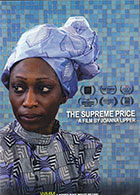
The Supreme Price 2013
Distributed by Women Make Movies, 115 W. 29th Street, Suite 1200,New York, NY, 10001; 212-925-0606
Produced by Joanna Lipper
Directed by Joanna Lipper
DVD, color, 75 min.
High School - General Adult
Africa, Human Rights
Date Entered: 09/16/2016
Reviewed by Sandra Collins, Byzantine Catholic Seminary Library, Pittsburgh, PASince 1960, Nigeria has suffered the usual chaos of oil-rich but democracy-poor nations: years of military coups, one power-hungry and brutal dictatorship after another. Finally, in 1993, Nigerian businessman M.K.O. Abiola won the presidency in a seemingly democratic election, only to be immediately imprisoned. His wife, Kudirat, assumed an increasing politically active role, lobbying for his release and agitating for democratic principles, viewing Nelson Mandela’s efforts as a model to be emulated. However, both were eventually assassinated in 1998 by the repressive military regime of General Abacha before any sort of organized, effective democratic movement could take shape.
This film chronicles the efforts of their daughter, Hafsat, in her return to Nigeria to keep alive the democratic principles represented by her father’s election and her mother’s social and political activism. In particular, Hafsat Abiola-Costello is responsible for establishing KIND, the Kudirat Initiative for Democracy, focusing specifically on developing leadership roles for women in Nigeria.
Part political history, part gender and religious history, the story of Abiola-Costello and her family provides insight into modern Nigerian politics, Muslim social norms and the gender dynamics at work behind these competing cultural and political forces. According to Abiola-Costello, to be an activist and a wife are mutually exclusive categories in Muslim Nigerian society. Yet, to be an activist also means that she, Abiola-Costello, must leave her diplomat husband and children in the safety of Brussels while she pursues her activist ambitions in Nigeria. Says another female Nigerian activist, most Nigerian women have a PhD without benefit of school: that is, Pull Her Down syndrome, or the power of deeply entrenched patriarchal tribal cultures which disempower women before they even rise to political consciousness. Even Abiola-Costello’s own observant Muslim brother applauds her work on behalf of democratic principles, but disavows support for her should she choose to run for president or any sort of political leadership role as, he says, there are men who are able to fulfill these roles better.
A soft-spoken but intensely committed activist, Abiola-Costello frames this toxic mix of corruption, poverty and oil in terms that seeks to enable and empower women to speak for those who are most at risk—the women and children. The relentless poverty, after so many decades of corruption and abuse, now makes Nigeria absolutely ripe for a new power-hungry opportunist: Al Qaida and Boko Haram. In light of this, she concludes, “Any society that is silencing its women has no future.”